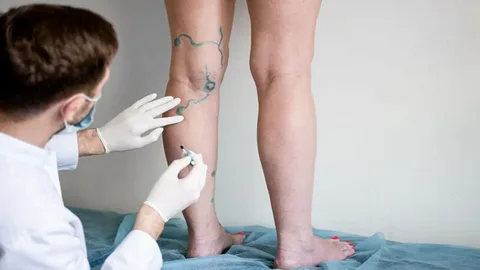Varicose veins are not just a cosmetic issue; they can also be a sign of underlying vein health problems that require medical attention. While many people manage varicose veins with lifestyle changes or non-invasive treatments, there are situations where consulting a vascular surgeon is essential. Understanding when to seek expert care can help you maintain optimal vein health and prevent complications.
What Are Varicose Veins?
Varicose veins are enlarged, twisted veins that often appear on the legs and feet. They result from weakened or damaged valves in the veins, which cause blood to pool and veins to become distended. While they are commonly harmless, varicose veins can sometimes lead to discomfort, pain, or more severe health issues.
Signs That It’s Time to See a Vascular Surgeon
-
Persistent Pain or Discomfort
If your varicose veins cause aching, throbbing, or a heavy sensation in your legs that doesn’t improve with rest or over-the-counter remedies, it’s time to seek professional help. Pain that worsens after standing or sitting for extended periods may indicate a more serious problem.
-
Swelling in the Legs
Swelling around the ankles or lower legs can be a sign of poor circulation due to venous insufficiency. This symptom often accompanies varicose veins and requires a thorough evaluation by a vascular surgeon.
-
Skin Changes
Varicose veins can cause changes in the skin over time, such as:
- Discoloration or darkening around the affected veins.
- Thickened or hardened skin, which may indicate lipodermatosclerosis.
- Development of ulcers or open sores near the ankles.
-
Bleeding or Clotting
Varicose veins close to the skin’s surface are more prone to injury and can bleed profusely if cut. Additionally, swollen veins can develop blood clots (superficial thrombophlebitis), causing redness, warmth, and pain. These situations require immediate medical attention.
-
Ineffective Conservative Treatments
If lifestyle changes, such as wearing compression stockings, elevating your legs, or exercising, don’t provide relief, a vascular surgeon can recommend advanced treatments tailored to your needs.
Advanced Treatment Options for Varicose Veins
A vascular surgeon specializes in diagnosing and treating vein-related issues. They can offer a variety of treatment options depending on the severity of your condition:
-
Endovenous Ablation Therapy
- Uses heat from laser or radiofrequency energy to close off damaged veins.
- Minimally invasive and performed under local anesthesia.
-
Sclerotherapy
- Involves injecting a special solution into the veins, causing them to collapse and fade over time.
- Effective for smaller varicose veins and spider veins.
- Vein Stripping and Ligation
- A surgical procedure to remove or tie off large, damaged veins.
- Recommended for severe cases that don’t respond to less invasive treatments.
-
Microphlebectomy
- Removes small varicose veins through tiny skin punctures.
- Minimally invasive with minimal scarring.
-
Ultrasound-Guided Treatments
- Allows the surgeon to target deeper veins that are not visible on the surface.
Benefits of Consulting a Vascular Surgeon
-
Accurate Diagnosis:
- A vascular surgeon will perform diagnostic tests, such as a Doppler ultrasound, to assess blood flow and identify underlying issues.
Customized Treatment Plans:
- Treatments are tailored to your specific condition, ensuring the best possible outcome.
Long-Term Relief:
- Advanced procedures address the root cause of varicose veins, reducing the risk of recurrence.
Prevention of Complications:
- Early intervention can prevent issues such as venous ulcers, deep vein thrombosis, or chronic venous insufficiency.
How to Prepare for Your Appointment
If you’re planning to see a vascular surgeon, here’s what you can do to prepare:
- Keep a Symptom Diary:
- Note when symptoms occur, their severity, and any triggers.
- List Your Questions:
- Prepare a list of questions about your condition and treatment options.
- Wear Comfortable Clothing:
- The surgeon may need to examine your legs, so wear loose-fitting clothes.
- Bring Relevant Records:
- If you’ve had prior imaging tests or treatments, bring those records to your appointment.
Varicose veins can range from a minor inconvenience to a serious medical concern. Recognizing the signs that require professional intervention is essential for maintaining your vein health and overall well-being. If you experience persistent symptoms, complications, or ineffective results from conservative treatments, consulting a vascular surgeon is the next step. With advanced diagnostic tools and treatment options, they can provide lasting relief and improve your quality of life. Don’t wait—schedule a consultation today to take control of your vein health. Take care of your health, no matter what we are talking about – vein health, face care, diabetic wounds.


